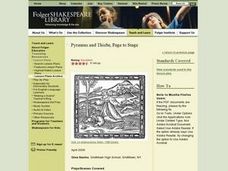Curated OER
Romeo and Juliet: To Tell, or Not to Tell
Should Romeo and Juliet have revealed their engagement to their parents? After reading Acts I and II of Shakespeare's Romeo and Juliet, your class discusses this question with a SMARTboard presentation (though the lesson still works if...
Curated OER
Romeo and Juliet Debate
Who is responsible for the deaths of Romeo and Juliet? After generating a list of the six characters most responsible, class members prepare for and engage in a formal debate. Prior knowledge of basic rules for debate would be necessary.
Curated OER
Romeo And Juliet: Act V Reading And Study Guide
In this reading and study guide worksheet, students define 4 vocabulary words, define 2 literary terms, and respond to 15 short answer questions pertaining to Act V of "Romeo and Juliet" by William Shakespeare.
Curated OER
Romeo And Juliet: Act III Reading And Study Guide
In this reading and study guide worksheet, students define 7 vocabulary words, define 4 literary terms, and respond to 32 short answer questions pertaining to Act III of "Romeo and Juliet" by William Shakespeare.
Curated OER
Romeo And Juliet: Act IV Reading And Study Guide
In this reading and study guide worksheet, students define 5 vocabulary words, define 2 literary terms, and respond to 15 short answer questions pertaining to Act IV of "Romeo and Juliet" by William Shakespeare.
Curated OER
Romeo & Juliet (Drama)
Ninth graders read and internalize the drama Romeo and Juliet by William Shakespeare. Many intriguing and thought provoking assignments are waiting for the completion of students within this lesson profile.
Curated OER
Literary Response and Analysis: Romeo and Juliet's
Tenth graders complete characterization analysis for Shakespeare's Romeo and Juliet. In this characterization lesson, 10th graders work in learning tiers to analyze the characters and plot in the play. Students work under, at, and above...
Curated OER
Scene Writing: Literacy and Playwriting
Drama is ever-present in our daily lives and eloquently depicted on stage. Middle schoolers practice writing scenes based on different prompts and frameworks, and then perform those creative scenes for their classmates. The activities...
Curated OER
Trust
Students read and discuss Romeo and Juliet Act IV, Scenes 1 and 2. They compare the unfolding action with yesterday's predictions. They consider the concepts of trust, fate, and self-determination.
EngageNY
Grade 9 ELA Module 1: Unit 3, Lesson 18
Why is Romeo and Juliet considered a tragedy? Class members conclude their reading of the play, focusing on the final lines of Act 5, scene 3. They also consider how Shakespeare structures the text, orders events, and manipulates time to...
EngageNY
Grade 9 ELA Module 1: Unit 3, Lesson 17
Romeo and Juliet, Act 5, Scene 3, lines 139-170, is the focus of this day's lesson plan. Readers examine the dramatic irony in Juliet's comments and consider how "lamentable chance" caused by a "greater power" plays a role in the tragedy.
EngageNY
Grade 9 ELA Module 1: Unit 3, Lesson 16
"Thus, with a kiss, I die." After viewing a film clip of the events leading up to Romeo's suicide, class members analyze Act 5, scene 3, lines 88-120, in which Romeo drinks the apothecary's poison.
Curated OER
"Very tragical mirth:" Romeo and Pyramus, Juliet and Thisbe
Students analyze and compare the poetic tools Shakespeare uses in the death scenes of Romeo and Juliet to those of Pyramus and Thisbe in Midsummer Night's Dream.
Curated OER
Pyramus and Thisbe, Page to Stage
Students read and interpret a script. Then they use higher order thinking skills to transfer information to long term memory. They use the information and interpretations in order to have a model to create dramatic scripts.















